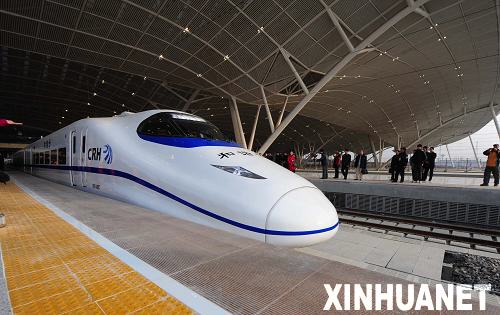Railway ministry shows improved profitability
 0 Comment(s)
0 Comment(s) Print
Print E-mail
China.org.cn, August 3, 2011
E-mail
China.org.cn, August 3, 2011
China's Ministry of Railways reported profits of 4.29 billion yuan (about US$670.31 million) during the first half of 2011, according to a statement released on Monday by the Shanghai Clearinghouse, an inter-bank clearinghouse authorized by the People's Bank of China and the Ministry of Finance.
The ministry?breathed a sigh of relief with the country's four top banks pledging to continue their financial support, Xinhua reported.
 |
|
Railway ministry shows improved profitability |
However, the ministry still faces grave pressures amid rising borrowing rates caused by government tightening measures. The ministry is also dealing with the fallout of the July 23 train crash that killed 40 people and injured 191 others in east China's Zhejiang Province.
The ministry's debts exceeded 2 trillion yuan as of the end of June, bringing its debt ratio up to 58.53 percent, slightly up from the end of the first quarter of this year.
Ou Guoli, a professor at Beijing Communications University, said that financial pressures are huge for the ministry, as both its debt and debt ratio are at high levels.
"The ministry will need to ask for more financing and carry more debts following its current expansion plan," Ou added.
To dispel fear that the heavily-indebted ministry may face higher lending rates due to the recent train accident, the Industrial and Commercial Bank of China, the Construction Bank of China (CCB), the Bank of China and the Agricultural Bank of China, the ministry's major lenders, said they will continue to offer loans based on market conditions and risk appraisal.
According to Zhao Qingming, a senior researcher with the CCB, railway construction projects are rely heavily on bank loans and bonds, which account for about half of the ministry's total financing.
In addition to increasing borrowing rates, the accident may make it harder for the ministry to raise funds from the bond market, as securities brokers are more sensitive to market changes, said Zhao.
Meanwhile, the public's concerns over railway safety have not been eased.
Luo Renjian, a researcher with the Institute of Comprehensive Transportation under the National Development and Reform Commission, said the higher debt ratio is normal and inevitable, as the ministry has largely relied on itself for funding without much financial support from the government.
"The ministry will see higher profits in two or three years, after the on-going rail construction projects are completed," he said.





